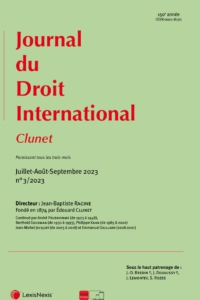Call for Papers: Public Interest Litigation (NILR)
The Netherlands International Law Review (NILR) has issued a call for papers, in particular for private international law perspectives of public interest litigation.
The Netherlands International Law Review (NILR) has issued a call for papers, in particular for private international law perspectives of public interest litigation.
The third issue of 2023 of the Rivista di diritto internazionale privato e processuale (RDIPP, published by CEDAM) was just released. It features:
Pietro Franzina, Professor at the Università Cattolica del Sacro Cuore, Un nuovo diritto internazionale privato della protezione degli adulti: le proposte della Commissione europea e gli sviluppi attesi in Italia (A New Private International Law on the Protection of Adults: The European Commission’s Proposals and the Developments Anticipated in Italy; in Italian)
 The latest issue of RabelsZ has just been released. It contans the following articles:
The latest issue of RabelsZ has just been released. It contans the following articles:
Horatia Muir Watt: Alterity in the Conflict of Laws. An Ontology of the In-Between
[18th Ernst Rabel Lecture, 2022] [OPEN ACCESS], 433–464, DOI: 10.1628/rabelsz-2023-0063
Two books on international litigation and arbitration have recently been published that might be of interest to the CoL Community and PIL research.
The first book by Mihail Danov (University of Exeter) is the latest contribution to Hart’s renowned “Studies in Private International Law” series (Volume 37) and examines the challenging interaction of “Private International Law and Competition Litigation in a Global Context“. The blurb reads as follows:
The third issue of the Journal du Droit international-Clunet of 2023 was released in July. It contains three articles and many case notes.
The first article Regard québécois sur le projet de Code de droit international priv é français (A view from Quebec on the project of a french private international law Code) is authored by Prof. Sylvette Guillemard (Université Laval). The abstract reads as follows:
é français (A view from Quebec on the project of a french private international law Code) is authored by Prof. Sylvette Guillemard (Université Laval). The abstract reads as follows:
Written by Ugljesa Grusic, Associate Professor at University College London, Faculty of Laws
Dr Ugljesa Grusic and Prof Alex Mills are pleased to announce that, alongside the UCL Faculty of Laws Research Scholarships which are open to all research areas, this year we have an additional scholarship specifically for doctoral research in private international law. The scholarship covers the cost of tuition fees (home status fees) and provides a maintenance stipend per annum for full time study at the standard UKRI rate. The annual stipend for 2023/24 (as a guide) was £20,622. The recipient of the scholarship will be expected to contribute to teaching private international law in the Faculty for up to 6 hours per week on average, and this work is remunerated in addition to the stipend received for the scholarship.
The Asian Private International Law Academy (APILA) will be holding its second conference at Doshisha University, Kyoto, on 9 and 10 December 2023. The keynote addresses will be delivered by Professor Emerita Linda Silberman on 9 December and Professor Gerald Goldstein on 10 December. The first day of the conference will comprise presentation and discussion of works-in-progress. The conference will devote most of 10 December to discussion and finalisation of the Asian Principles on Private International Law (APPIL) on three topics: (1) recognition and enforcement of foreign judgments, (2) direct jurisdiction, and (3) general choice of law rules. Persons interested in attending or wishing further information should email reyes.anselmo@gmail.com to that effect. Please note that, while APILA can assist attendees by issuing letters of invitations in support of Japanese visa applications, APILA’s available funding is limited. In the normal course of events, APILA regrets that it will not be able to provide funding for travel and accommodation expenses.
The Japanese Institute for International Arbitration Research and Training (JIIART) will be holding an online seminar investigating use of alternative dispute resolution mechanisms in insolvency this Saturday 21 October 2023 at 14:00-16:00 Japan Standard Time. The event is free to attend but registration is required. You may register here. Details of the programme and speakers can be found in the event poster.

